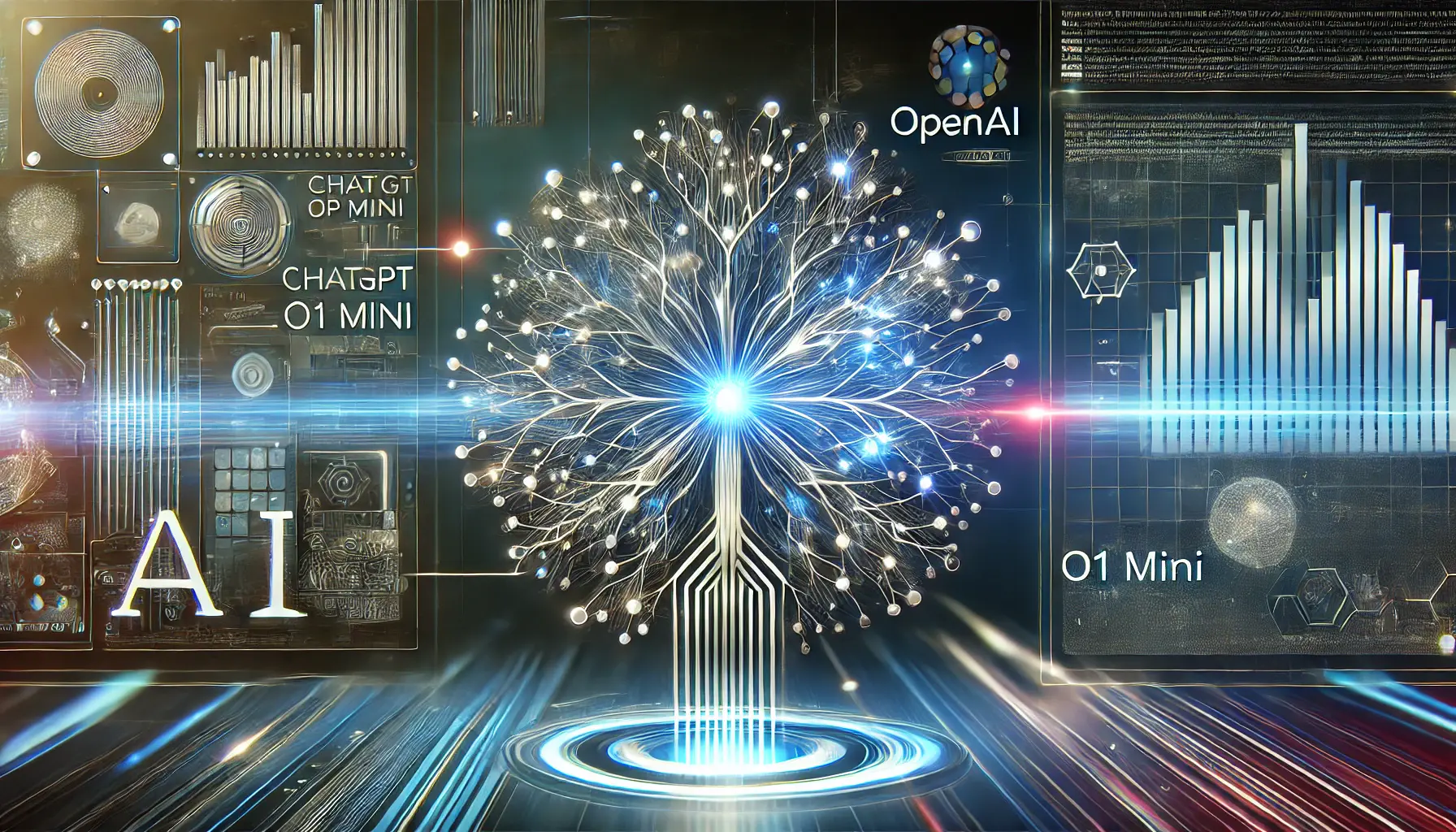In the rapidly evolving landscape of artificial intelligence, few developments have been as groundbreaking as the emergence of DeepSeek R1.
This innovative AI model has not only challenged existing paradigms but also redefined what’s possible in AI technology.
Let’s delve into the origins of DeepSeek R1 and explore how it came to be.
The Genesis of DeepSeek R1
Every revolutionary technology has its starting point, and for DeepSeek R1, it began with a vision to push the boundaries of AI capabilities.
Understanding this journey offers valuable insights into the model’s current prominence.

A glimpse into the early days of DeepSeek R1’s development, showcasing innovation and collaboration in an advanced AI research lab.
Founding of DeepSeek and Initial Vision
DeepSeek was established in 2023 by Liang Wenfeng, a former mathematical prodigy with a passion for advancing technology.
His vision was to create an AI model that could rival the best in the world, emphasizing efficiency and accessibility.
This ambition laid the foundation for what would become DeepSeek R1.

The early development of DeepSeek R1, where engineers and data scientists refine machine learning algorithms in a high-tech research environment.
Early Development Phases of DeepSeek R1
The initial development of DeepSeek R1 focused on assembling a team of young, ambitious talent and leveraging innovative training techniques.
By utilizing a combination of reinforcement learningA type of machine learning where an AI learns by receiving rewards or penalties for its actions. and a mixture of expertsA machine learning technique where multiple expert models contribute to making predictions, optimizing efficiency. models, the team aimed to create a model that was both powerful and resource-efficient.

Engineers and scientists navigate the early challenges of DeepSeek R1’s development, overcoming computational and algorithmic hurdles.
Challenges Faced During Initial Development
As expected, this innovative AI model brought its own set of challenges.
The team encountered several obstacles, including:
- Limited computational resources, which made large-scale training difficult.
- Complexities in training advanced models that required high levels of optimization.
- The need for efficient algorithmic improvements to enhance performance.
Despite these hurdles, the developers of DeepSeek R1 remained committed to their vision.
Through innovative approaches and persistence, they overcame these difficulties, setting the stage for the success of DeepSeek R1.
DeepSeek R1 was founded with the vision of creating an AI model that rivals the best in the world, emphasizing efficiency and accessibility.

DeepSeek R1’s cutting-edge features and innovations, highlighted through an advanced AI interface and dynamic data streams.
Key Features and Innovations of DeepSeek R1
DeepSeek R1 has rapidly emerged as a transformative force in artificial intelligence, introducing several groundbreaking features that set it apart from its competitors.
Let’s explore the key innovations that make DeepSeek R1 a standout in the AI landscape.

DeepSeek R1’s advanced reasoning capabilities visualized through a highly sophisticated AI core and cognitive processing network.
Advanced Reasoning Capabilities
One of the most impressive aspects of DeepSeek R1 is the depth of its reasoning capabilities.
The model excels in logical inference, mathematical problem-solving, and real-time decision-making.
This is achieved through a unique training methodology based on reinforcement learning, allowing the AI to develop complex reasoning skills autonomously.
These include:
- Chain-of-thought processing – enabling step-by-step logical problem-solving.
- Self-verification – assessing its own outputs for accuracy.
- Error correction – refining responses based on learned patterns.
With the ability to break down even the most complicated tasks into manageable steps, DeepSeek R1 produces highly accurate, context-aware outputs, making it one of the most intelligent AI models available.

DeepSeek R1’s advanced computational efficiency, optimizing resource usage while maintaining high AI performance.
Efficiency in Computational Resource Usage
DeepSeek R1 was designed with efficiency in mind, utilizing a Mixture of Experts (MoE) architecture.
This framework includes 671 billion parameters but only activates 37 billion during inference, optimizing computational resources without compromising performance.
The benefits of this design include:
- Lower computational costs compared to other large-scale AI models.
- Higher scalability due to optimized resource allocation.
- Improved inference speed while maintaining output quality.
Thanks to this architecture, DeepSeek R1 achieves high efficiency while reducing the cost of AI model training, making it more accessible for businesses and developers.
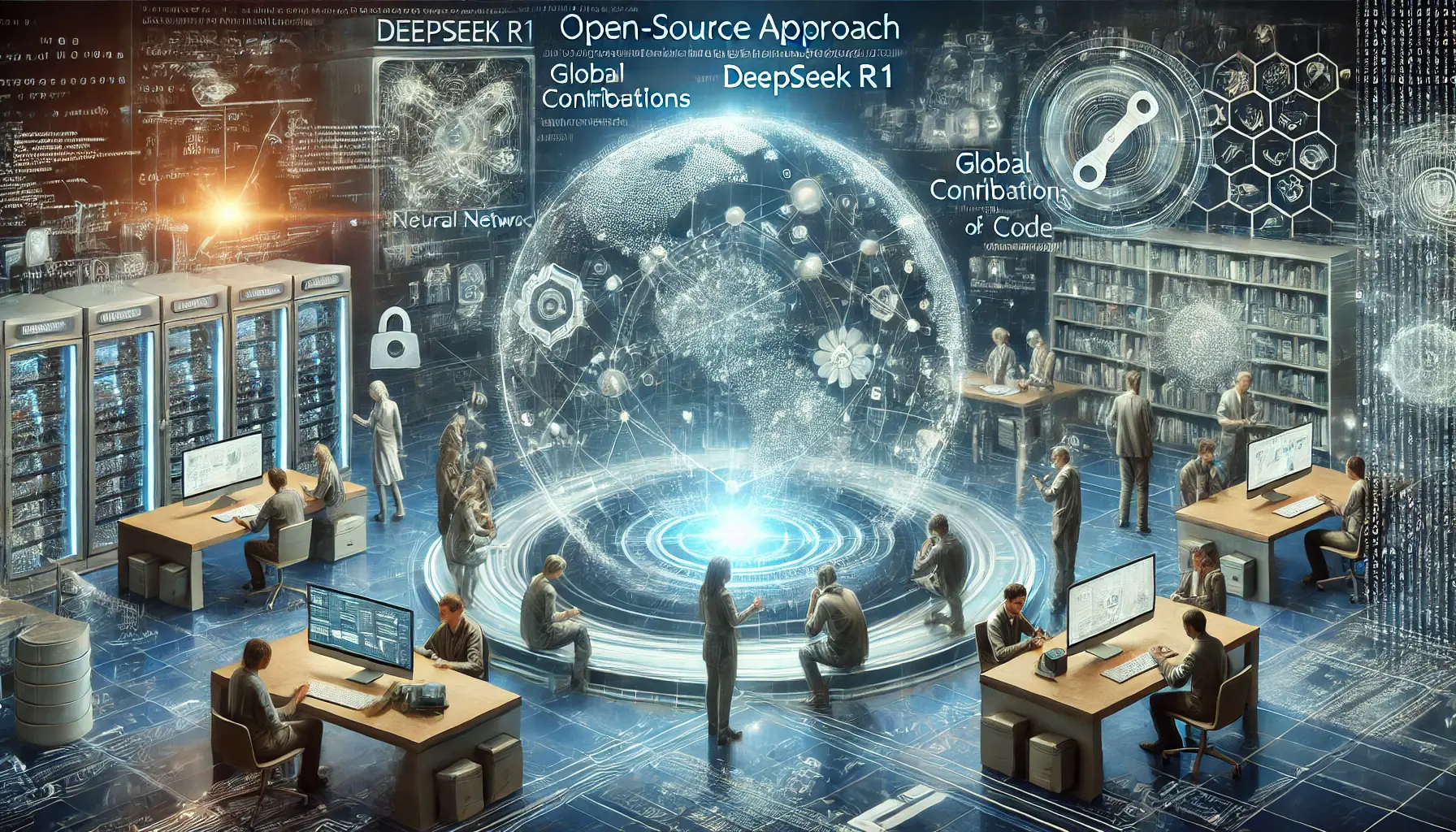
DeepSeek R1’s open-source model fosters global collaboration and innovation in AI development.
Open-Source Approach and Its Impact
Embracing an open-source philosophy, DeepSeek R1 is distributed under an MIT licenseA permissive open-source software license that allows users to freely use, modify, and distribute the software., allowing researchers and developers to inspect, modify, and integrate the model into their projects without licensing constraints.
This approach fosters:
- Community-driven innovation – encouraging contributions from AI researchers worldwide.
- Greater accessibility – making AI advancements available to a broader audience.
- Faster adoption – enabling businesses to integrate cutting-edge AI without high costs.
By making its technology freely available, DeepSeek R1 democratizes access to AI, accelerating advancements across industries and paving the way for new AI-driven solutions.
In summary, DeepSeek R1 combines advanced reasoning capabilities with efficient computation, all while embracing an open-source model.
This positions it as a leader in the AI domain, offering transformative potential across multiple industries.
DeepSeek R1 stands out with its advanced reasoning, efficient computational design, and open-source approach, making it a significant player in AI advancements.
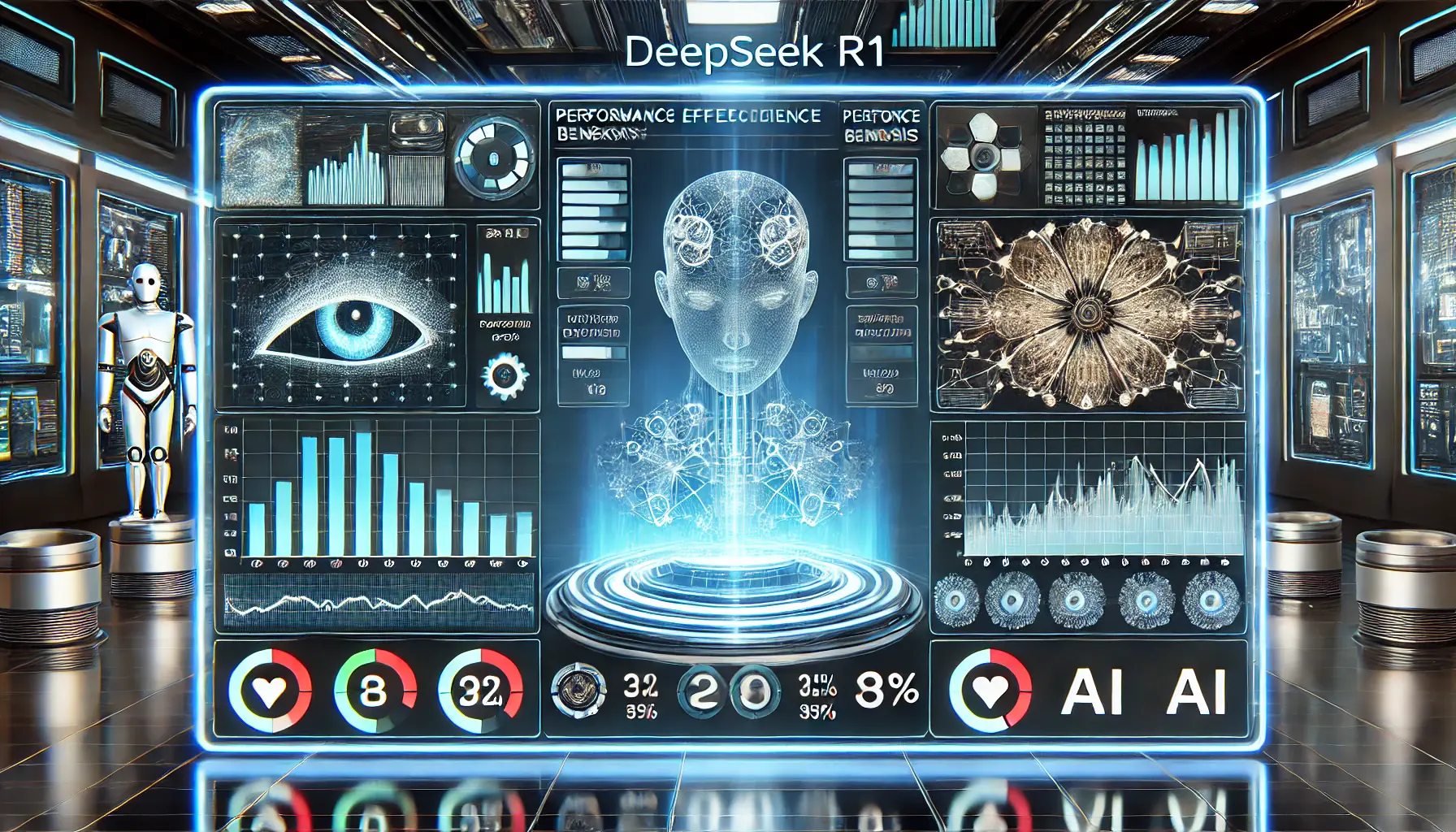
DeepSeek R1’s performance and efficiency compared to other AI models in a competitive analysis interface.
Comparative Analysis: DeepSeek R1 vs. Competitors
In the rapidly evolving field of artificial intelligence, it’s essential to understand how DeepSeek R1 measures up against its competitors.
Let’s delve into performance benchmarks, market reception, and the strengths and limitations of DeepSeek R1 in various applications.
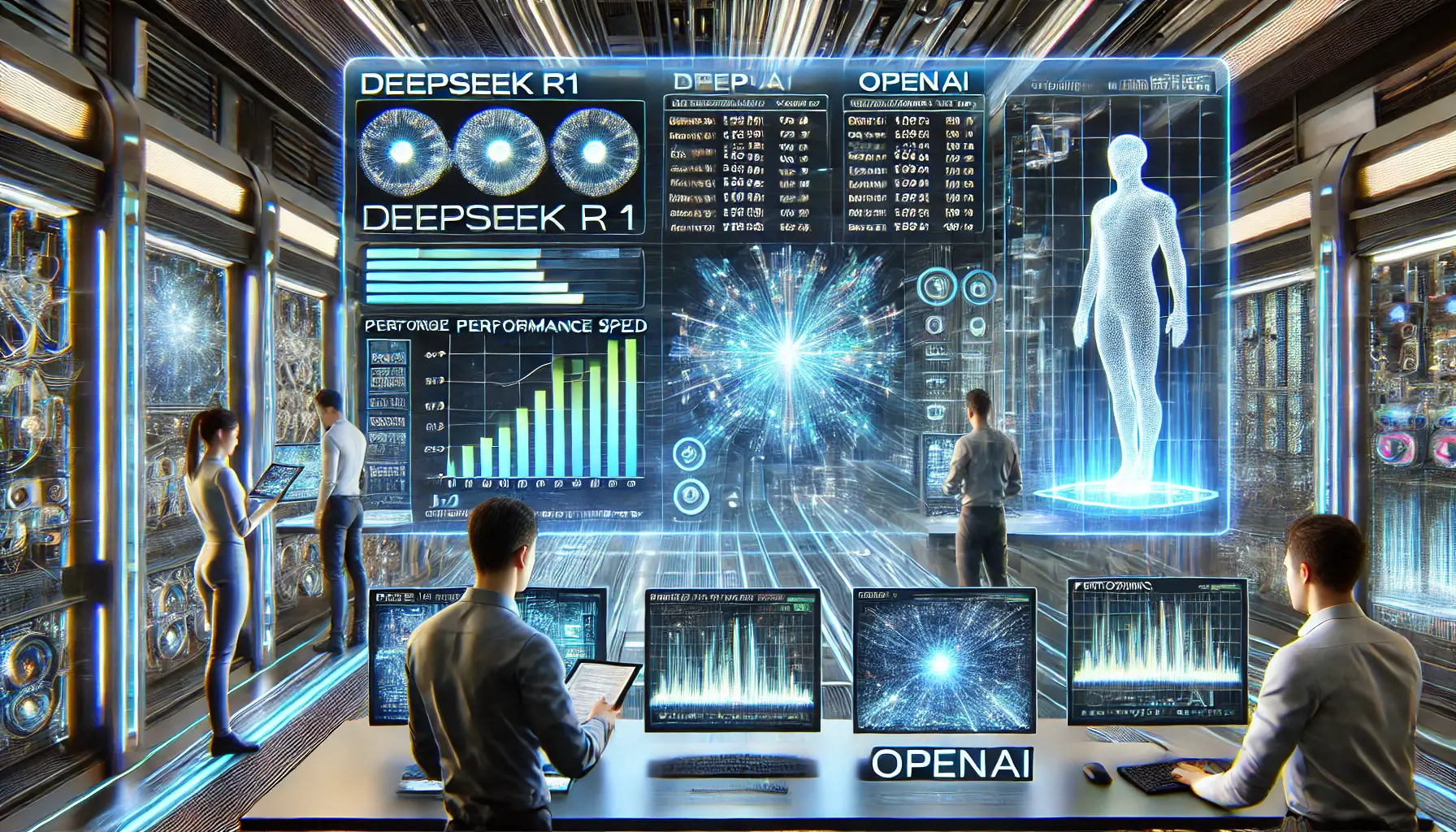
A high-tech benchmarking lab analyzing the performance of DeepSeek R1 against OpenAI’s models through real-time AI testing data.
Performance Benchmarks Against OpenAI’s Models
When evaluating AI models, performance benchmarks provide valuable insights.
DeepSeek R1 has demonstrated impressive results in several key areas:
- Mathematics: DeepSeek R1 achieved a 97.3% Pass@1 score on the MATH-500 benchmark, a performance comparable to OpenAI’s O1-1217 model. On the AIME 2024 benchmark, it attained a score of 79.8%.
- Coding: DeepSeek R1 achieved an Elo rating of 2029 on the Codeforces benchmark, placing it in the top percentile of participants. It also performed exceptionally well on SWE Verified and LiveCodeBench assessments.
- Reasoning: The model achieved a Pass@1 score of 71.5% on the GPQA Diamond benchmark, highlighting its strong logical reasoning capabilities.
These results highlight DeepSeek R1’s competitive performance in complex reasoning and problem-solving tasks, positioning it alongside leading models in the industry.

DeepSeek R1’s impact on market adoption and user engagement, visualized through an advanced analytics hub.
Market Reception and User Adoption Rates
The market’s response to DeepSeek R1 has been notably positive.
Shortly after its release, the model’s AI assistant became the top-rated free application on the U.S.
Apple App Store, surpassing established competitors.
This rapid ascent indicates strong user interest and satisfaction.
Businesses have also shown enthusiasm for DeepSeek R1.
Companies like New York Life and SAPA multinational software corporation specializing in enterprise resource planning and business applications. are exploring its capabilities, drawn by its cost-efficiency and high performance.
However, some organizations remain cautious due to concerns about data security and the model’s Chinese origin.

DeepSeek R1’s advantages and constraints visualized through a high-tech AI assessment interface.
Strengths and Limitations in Various Applications
Understanding the practical applications of DeepSeek R1 involves assessing both its strengths and limitations:
- Strengths: Cost-Effectiveness
- Limitations: Safety Concerns
DeepSeek R1 is undeniably a serious player in the AI landscape, offering a strong cost and performance advantage.
However, its safety features, privacy considerations, and regulatory complianceAdherence to laws and regulations that govern data privacy, security, and ethical AI use. must be carefully evaluated by potential adopters to ensure it meets their specific needs.
DeepSeek R1 has achieved impressive benchmark results, proving its competitive standing against industry leaders such as OpenAI.

DeepSeek R1’s transformative impact on the AI industry, visualized in a futuristic tech conference setting.
Impact of DeepSeek R1 on the AI Industry
The release of DeepSeek R1 has sent ripples through the artificial intelligence sector, challenging existing paradigms and prompting significant reactions from industry leaders and markets alike.
Let’s explore how this innovative model is reshaping the AI landscape.
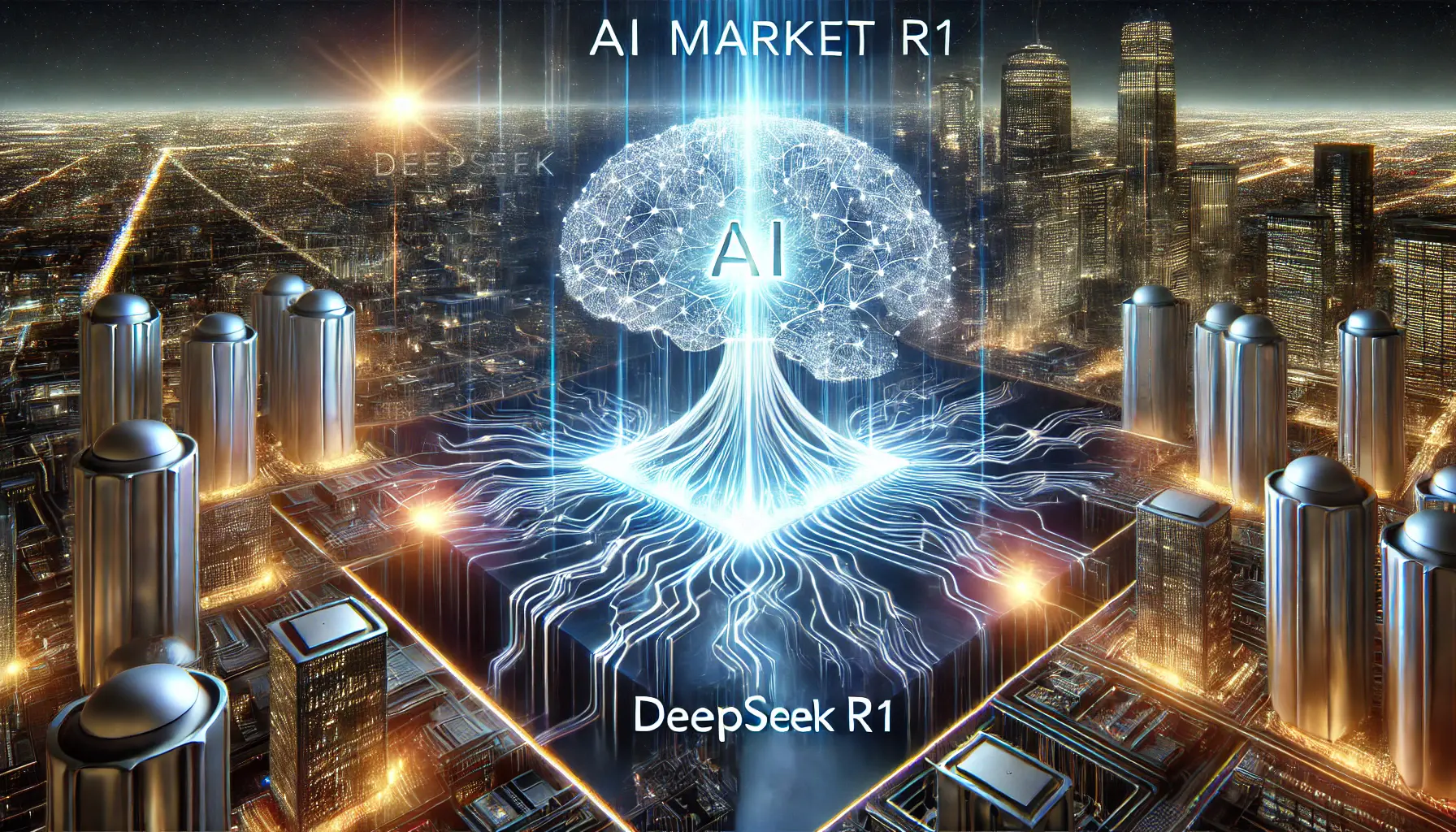
DeepSeek R1 disrupts traditional AI market dynamics, symbolized by evolving algorithms and interconnected systems.
Disruption of Established AI Market Dynamics
DeepSeek R1 has disrupted traditional AI market dynamics in several ways:
- Cost Efficiency: DeepSeek R1 was developed at a fraction of the cost compared to similar models, proving that high-performance AI can be achieved with relatively modest financial investments.
- Open-Source Accessibility: By adopting an open-source approach, DeepSeek R1 has made advanced AI technology accessible to a wide range of users, fostering broader applications and inspiring industry-wide innovation.
- Performance Parity: Despite its lower development costs, DeepSeek R1 delivers performance on par with leading models from established tech giants, challenging the assumption that only resource-intensive AI models can be powerful.

The financial analysis of DeepSeek R1’s market reactions and the broader economic implications of its release.
Market Reactions and Financial Implications
The introduction of DeepSeek R1 has had notable financial repercussions:
- Stock Market Volatility: Following its release, major technology stocks experienced fluctuations, with companies like Nvidia seeing substantial drops in market capitalization.
- Investor Reassessment: Investors are reevaluating their positions in AI-related stocks, considering the potential for new entrants like DeepSeek R1 to disrupt established players.

The global influence of AI and the geopolitical shift in leadership driven by models like DeepSeek R1.
Geopolitical Considerations and Global AI Leadership
DeepSeek R1’s success has broader geopolitical implications:
- China’s Technological Advancement: The model’s development highlights China’s growing capabilities in AI, positioning it as a strong competitor against U.S.-based AI firms.
- Policy Responses: The U.S. and other nations may need to reassess their AI strategies, including increased funding for research, talent development, and fostering international cooperation in AI innovation.
In summary, DeepSeek R1 is not just a technological milestone but also a catalyst for significant changes in the AI industry.
Its influence extends beyond innovation, impacting market dynamics, financial markets, and global technological leadership.
The rise of DeepSeek R1 is reshaping AI market dynamics, challenging established players, and influencing global AI strategies.

DeepSeek R1’s future prospects and ongoing developments, visualized through an advanced AI research and development environment.
Future Prospects and Developments for DeepSeek R1
As we look ahead, the trajectory of DeepSeek R1 suggests several avenues for growth and influence in the artificial intelligence landscape.
Let’s explore the potential future developments and their implications.

Showcasing the anticipated advancements in AI technology, as engineers work with evolving AI systems in a high-tech lab.
Anticipated Technological Advancements
Building upon its current capabilities, DeepSeek R1 is expected to undergo significant technological enhancements:
- Improved Efficiency: Future versions could be further optimized in terms of computational efficiency, reducing reliance on high-end hardware and making advanced AI applications more affordable to a wider audience.
- Expanded Open-Source Collaborations: With its open-source foundation, DeepSeek R1 is likely to drive more collaborations, leading to faster iterations, improvements, and global developer contributions.

The potential disruption of industries such as finance, healthcare, and technology by the advent of innovative AI technologies.
Potential Industry Disruptions
The advancements in DeepSeek R1 may have significant consequences for the AI industry, including:
- Cost Reduction in AI Development: The model’s efficient architecture could set new standards for cost-effective AI development, challenging existing pricing models and making AI more accessible to businesses of all sizes.
- Shift in Market Leadership: As DeepSeek R1 continues to evolve, it has the potential to reshape the competitive landscape, positioning new leaders in AI innovation and possibly displacing established players.

The global implications of AI technologies like DeepSeek R1, highlighting international collaborations and strategic geopolitical considerations.
Global Implications and Strategic Considerations
The evolution of DeepSeek R1 carries significant global implications:
- Geopolitical Dynamics: The success of DeepSeek R1 underscores the growing influence of Chinese AI enterprises, prompting a reevaluation of global technological leadership.
- Ethical and Regulatory Challenges: As the model gains widespread adoption, discussions around data privacy, ethical use, and regulatory compliance will become increasingly important.
In summary, DeepSeek R1 has a promising future in AI innovation and influence.
Its ongoing advancements could redefine multiple aspects of the AI industry, reshaping global technology dynamics and opening new possibilities for businesses and developers worldwide.
As AI continues evolving, ethical and regulatory challenges surrounding DeepSeek R1’s adoption must be addressed.
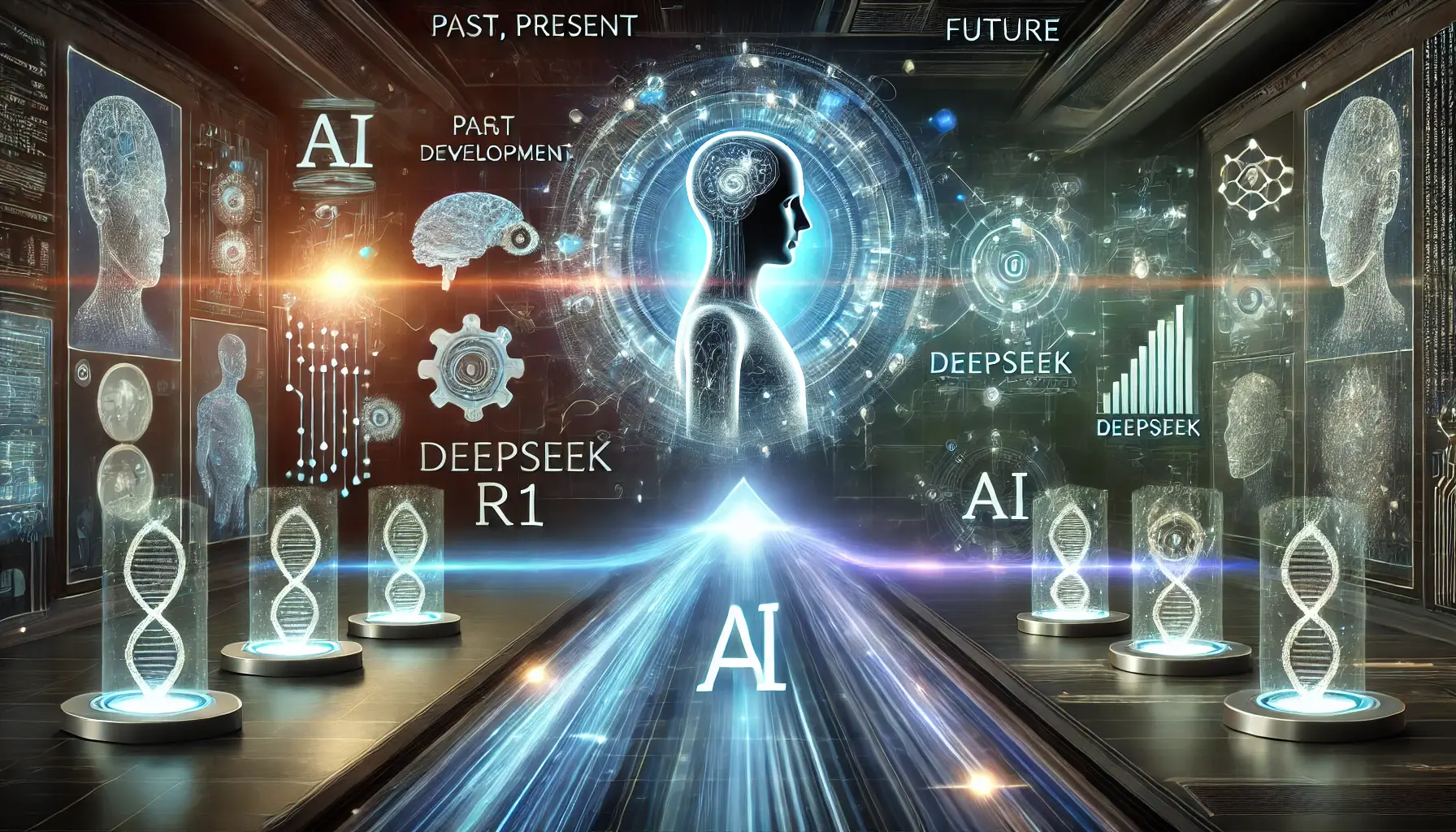
The continuous evolution and future advancements of DeepSeek R1, visualized through a dynamic digital timeline and holographic projections.
The Evolution and Future of DeepSeek R1
DeepSeek R1 has emerged as a revolutionary AI model, pushing the boundaries of artificial intelligence with its innovative approach, efficient architecture, and open-source accessibility.
From its inception to its ongoing developments, this model has significantly impacted the AI landscape and is set to play a crucial role in shaping the future of AI technology.

DeepSeek R1’s evolution and key advancements in reasoning, efficiency, and AI capabilities visualized in a futuristic research lab.
Key Takeaways from DeepSeek R1’s Evolution
The journey of DeepSeek R1 highlights several key milestones and contributions to the AI industry:
- Strong Foundations: DeepSeek R1 enhances advanced reasoning abilities, incorporating reinforcement learning, self-verification, and error correction for improved decision-making.
- Computational Efficiency: The model leverages a Mixture of Experts (MoE) architecture, activating only a fraction of its parameters per inference, making it more resource-efficient compared to traditional AI models.
- Open-Source Influence: Unlike many proprietary AI models, DeepSeek R1 fosters global collaboration by allowing developers worldwide to contribute to its growth and continuous improvements.
- Market Disruption: With its competitive performance against AI giants like OpenAI, DeepSeek R1 has driven discussions about AI accessibility and cost-effective model development.
- Geopolitical Impact: Its development signifies China’s growing leadership in AI, prompting shifts in global technological dominance and research priorities.

DeepSeek R1’s future advancements and its transformative impact on multiple industries.
The Future of DeepSeek R1 and Its Industry Impact
The future of DeepSeek R1 holds promising advancements and challenges.
Some of the key expectations include:
- Further Technological Advancements: Future updates of DeepSeek R1 may bring enhanced efficiency, lower dependency on high-end hardware, and improved performance across diverse applications.
- Wider Adoption Across Industries: DeepSeek R1 is expected to see increased utilization in fields such as coding, mathematical modeling, decision-making systems, and automation.
- Regulatory and Ethical Challenges: As the model gains wider adoption, discussions about AI governance, ethical use, and data privacy will become more critical in shaping policies.
- Competitive AI Landscape: The rise of DeepSeek R1 may push other AI firms to rethink their strategies, encouraging faster innovation and making AI technology more accessible globally.

DeepSeek R1’s pivotal role in shaping the future of artificial intelligence, connecting to various sectors and industries.
Final Thoughts: DeepSeek R1’s Role in AI’s Future
DeepSeek R1 is more than just an AI model—it represents a movement toward open, efficient, and globally collaborative artificial intelligence.
By challenging industry norms, accelerating technological advancements, and promoting AI accessibility, it has positioned itself as a vital player in the future of AI development.
While challenges remain, including regulatory concerns and data privacy discussions, DeepSeek R1 is expected to continue shaping the AI landscape for years to come.
Whether through further open-source contributions, technological refinements, or competitive disruptions, this model is undeniably a transformative force in artificial intelligence.
DeepSeek R1 is set to drive AI advancements further, but the industry must closely monitor its implications on AI accessibility, security, and governance.

Engineers and experts engage in problem-solving and Q&A about DeepSeek R1’s capabilities in a futuristic AI lab.
DeepSeek R1: Frequently Asked Questions
DeepSeek R1 is an open-source AI model developed by Chinese startup DeepSeek.
It is known for its advanced reasoning capabilities, computational efficiency, and scalable architecture, making it a significant player in the AI industry.
DeepSeek R1 offers performance comparable to leading models like OpenAI’s O1, particularly in reasoning and problem-solving tasks, while maintaining significantly lower computational costs.
Yes, DeepSeek R1 is released under the MIT license, allowing developers worldwide to use, modify, and distribute the model freely, fostering innovation and accessibility.
Some users have raised concerns about data privacy due to DeepSeek R1 being developed in China.
Reviewing the terms of service and considering self-hosting options for sensitive applications is advisable.
DeepSeek R1 is recognized for its advanced reasoning capabilities, efficiency-driven Mixture of Experts (MoE) architecture, and open-source framework, making it highly adaptable for multiple applications.
DeepSeek R1 is available via DeepSeek’s official website and mobile applications.
Developers can also access the model through APIs or download it for self-hosting.
Industries such as finance, healthcare, and technology can utilize DeepSeek R1 for data analysis, decision-making support, automation, and AI-powered research.
While powerful, DeepSeek R1 may exhibit biases present in its training data and sometimes struggle with nuanced context in specific applications.
DeepSeek R1 was built using reinforcement learning techniques and a Mixture of Experts model, focusing on improving efficiency, adaptability, and accessibility in AI technology.








